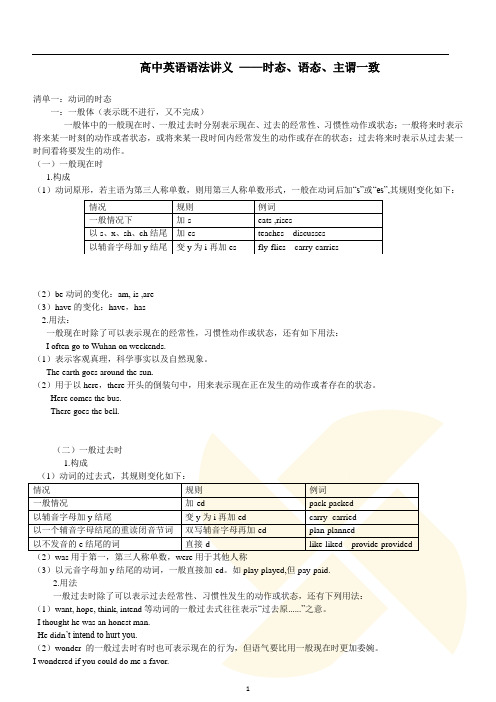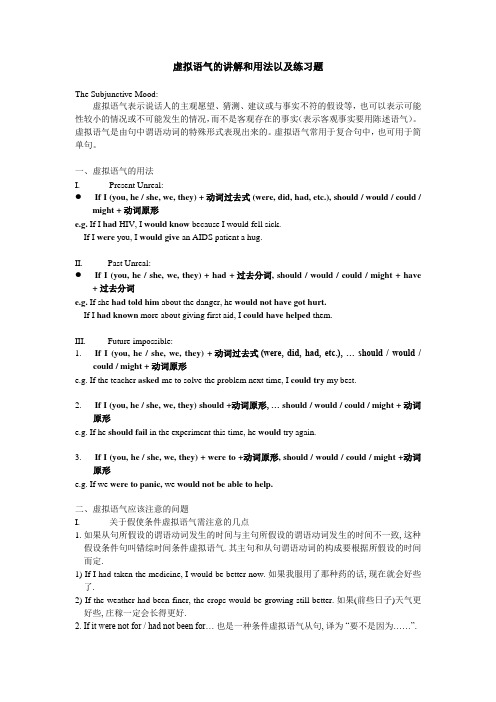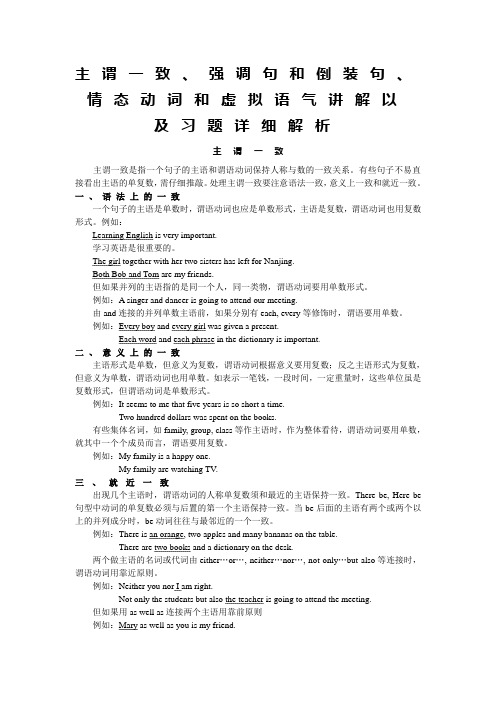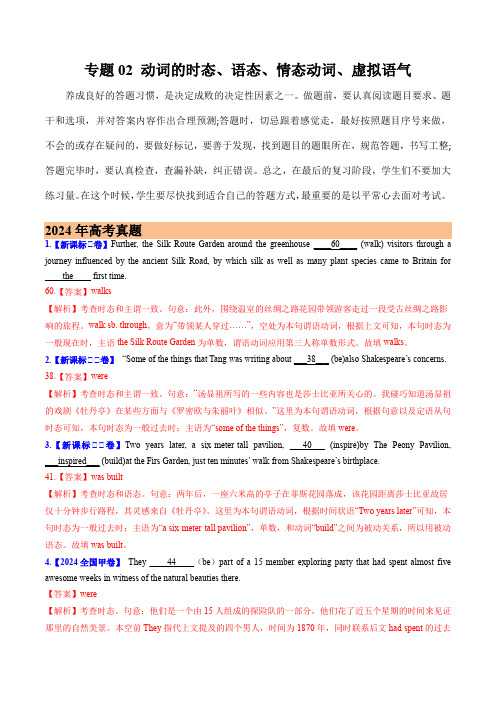动词时态语态虚拟语气主谓一致
动词的时态及语态+主谓一致

三、动词的时态及语态I 时态时态考查项目1 过去完成时2 现在完成进行时3 将来完成时4 一般现在时(用于表示客观事实/科学真理)答题依据: 句中时间状语主从句谓语动词的先后关系语境时态的呼应(the sequence of tenses)时态呼应是指从句中谓语动词的时态因受主句中谓语动词时态的影响而须采用一定的时态,从而达到两者在逻辑关系上的一致。
(一)主句谓语动词的时态为现在时或将来时,从句谓语动词根据实际情况可用各种时态She says she is a college student.she was a college student.she will be a college student.Has he told you when he is to leave for Beijing?Will you tell me when you finished the work?(二)主句谓语动词用过去时态1 若从句谓语动词的动作与主句谓语动词的动作同时发生,从句用一般过去时或过去进行时She told me she was a teacher.He said he was studying English.2 若从句谓语动词的动作发生在主句谓语动词的动作之前,从句用过去完成时或过去完成进行时She explained to me that she had made the mistake chieflyout of carelessness.Betty said that she had been waiting for my call.3 若从句谓语动词的动作发生在主句谓语动词的动作之后,从句用过去将来时、过去将来进行时或过去将来完成时。
He said that he would come back the next day.She said that she would be setting off on the 10 o’clock train.He told them that he would have finished by six o’clock.4 若从句谓语动词的动作发生在主句谓语动词的动作之前,但从句中有表示某一具体时间的状语,从句用一般过去时。
李辉老师语法主谓一致

讲义·主谓一致谓语动词三要素:主被动、时态、主谓一致(虚拟语气、情态动词)主语和谓语动词在单、复数形式上的一致,就是主谓一致。
也就是,如果名词中心词是单数,动词用单数形式;如果名词中心词是复数,动词用复数形式。
My family _is_ (be) a big one.My family _are_ (be) watching TV.family = 整体(一个家)= 单数family = 家庭里所有的成员= 复数【壹】语法形式一致原则一、主语中心词后面有表示“增、减、补充说明”的词组时,主谓一致仍看中心词表示增加的:as well as, with, along with, together with, in addition to, accompanied by, besides, plus等along with 和in addition to 除此之外(包含前面的内容)besides 除此之外(包含前面的内容)accompanied by 跟随着……plus 加上,还有The man (together with his wife and children) sits on the sofa watching TV.那个人和他妻儿老小坐在沙发上看电视。
The man, his wife and their children sit on the sofa watching TV.and是并列连词表示减去的:except, but(除去)等All the students (except Tom) have been to America.除汤姆外,其他学生都去过美国。
I want nobody but you.表示补充说明的:including, rather than, like(像), such as等The text book, plus its reference books, is well designed.这本教材,还有参考书,设计的都很好。
2024年新高考版英语主谓一致、虚拟语气、省略、倒装、强调讲解部分

“a number of+复数名词”作主 A number of other plants were
语时,谓语动词用复数形式,意为 found in America.在美洲还发现
“许多……”;“the number of+ 了许多其他的植物。
复数名词”作主语时,谓语动词 The number of people who travel
复合不定代词someone、anyone、everyone、nobody/no one、something、anything、everything、nothing等作主语时,谓语动词用单数
If anyone sees Lisa, ask her to call me.如果有人看 到莉萨,请她给我打个电话。 Nothing is impossible to a willing heart.世上无难 事,只怕有心人。
If he shouldn't come tomorrow, we would put off the meeting.如果他 明天不来,我们就推迟 这个会议。
使用“(should+)动词原形”的虚拟语气 1.用于宾语从句 以下动词后的宾语从句常常使用虚拟语气,即谓语为“(should+)动词原 形”。
原则
意义 一致
课标必备点梳理
常见用法
例句
当“几分之几/百分之几/half/ the rest/most+of+名词”结构作 主语时,一般根据of后的名词的 单复数决定谓语动词的单复数
20% of the people in the city object to the price of running water going up. 这个城市中百分之二十的人反 对自来水价格上调。
2020届二轮复习 动词的时态、语态、主谓一致和虚拟语气 课件

(be)both widely reviewed and highly praised, strengthened Dickens' status as a leading novelist.
was being followed (follow). 13.(2017·高考江苏卷改编)He's been informed that he doesn't qualify (not
qualify) for the scholarship because of his academic background. 14.(2017·高考全国新课标卷Ⅱ)Truly elegant chopsticks might be made (make) of
2.通过思考时间标志词、主被动关系、是否符合事实、主语单复数、固定句型 来确定谓语动词的形式。 (1)通过时间标志词语定时态。不同的时间表示动作发生时间点或时间段不同,谓 语动词要用不同的形式,即时态。近几年高考主要考查谓语动词的一般现在时、 一般过去时、一般将来时、现在完成时、过去完成时、现在进行时、过去进行时 等,很少涉及将来进行时、将来完成时、过去将来时。抓住时间标志词语,是确 定谓语动词形式的关键。常见的时态标志词有:
非谓语 动词
2 3 2
并列连 词/复 合句及 其他
1
1
1
命题趋势: ①由对语法知识的考核到对语法技能的考核的转变; ②在语境中全面考查语法知识,借助多种考查方式,把对考生的要求由“一知半 解”提高到自然地、自发地运用语法知识去表达的水平。
高中英语 动词的时态、语态和主谓一致精讲

(3)表示人的“观点” “看法” “建议” “态 度” “评价”等词、“活动的目的”以及客观 事实时,常用一般现在时。
A good medicine __t_a_s_te_s__(taste) bitter. Our geography teacher told us that the earth __g_o_es_(go) around the sun.
2
(2)用于状语从句代替一般将来时 在when , as soon as , before , after , until , if 等引 导的时间状语或条件状语从句,谓语动词是将来 时通常用一般现在时代替。 “主将从现”
If he succeeds(succeed), he will be the hero of human beings.
Terry and his wife were tidying up their new home busilyw_h_e_n_ the light suddenly went out.
I was about to go out w__h_e_n the telephone rang.
9
6.现在完成时 构成形式: 助动词have/has + 动词的过去分词
4
2.一般过去时 构成形式 did
表示过去某一时间点发生的动作或所处的状态.
注意:一般过去时往往和明确的过去时间状语连 用.如: yesterday, last night, two days (months, weeks) ago, in 1996, the other day也常和when, if 等 引导的状语从句连用.
10
So far, it has turned (turn) the most influential student activity in the world.
高中英语语法讲义 ——时态、语态、主谓一致

高中英语语法讲义——时态、语态、主谓一致清单一:动词的时态一:一般体(表示既不进行,又不完成)一般体中的一般现在时、一般过去时分别表示现在、过去的经常性、习惯性动作或状态;一般将来时表示将来某一时刻的动作或者状态,或将来某一段时间内经常发生的动作或存在的状态;过去将来时表示从过去某一时间看将要发生的动作。
(一)一般现在时1.构成(1)动词原形,若主语为第三人称单数,则用第三人称单数形式,一般在动词后加“s”或“es”,其规则变化如下:情况规则例词一般情况下加-s eats ,rises以s、x、sh、ch结尾加-es teaches discusses以辅音字母加y结尾变y为i再加es fly-flies carry-carries(2)be动词的变化:am, is ,are(3)have的变化:have,has2.用法:一般现在时除了可以表示现在的经常性,习惯性动作或状态,还有如下用法:I often go to Wuhan on weekends.(1)表示客观真理,科学事实以及自然现象。
The earth goes around the sun.(2)用于以here,there开头的倒装句中,用来表示现在正在发生的动作或者存在的状态。
Here comes the bus.There goes the bell.(二)一般过去时1.构成情况规则例词一般情况加-ed pack-packed以辅音字母加y结尾变y为i再加ed carry- carried以一个辅音字母结尾的重读闭音节词双写辅音字母再加-ed plan-planned以不发音的e结尾的词直接-d like-liked provide-provided(2)was用于第一,第三人称单数,were用于其他人称(3)以元音字母加y结尾的动词,一般直接加-ed。
如play-played,但pay-paid.2.用法一般过去时除了可以表示过去经常性、习惯性发生的动作或状态,还有下列用法:(1)want, hope, think, intend等动词的一般过去式往往表示“过去原......”之意。
高考英语二轮复习课件核心语法必备 专题 谓语动词(动词的时态、语态、主谓一致、情态动词和虚拟语气)

复数
视
单复数同形的名词, 如means, deer, fish, sheep等
情
all, none, some, any等不定代词
况
“half/most/part/the rest/the last/lots/plenty/分数/百分数+of+名词” 而
做主语, 谓语要和of之后的名词单复数保持一致
By the time Jack returned home from
表示一个动作或状态从过去 England, his son had graduated from 某一时间之前已经开始, 一直 college. 持续到过去这一时刻的动作 杰克从英国回到家中时, 他的儿子已经大
学毕业。
重点一
重点二
高考总复习
核心语法
必
备
专题一 谓语动词(动词的时态、语态、 主谓一致、情态动词和虚拟语气)
英语
内容索引
要点精讲•破疑解难 对点演练•精准提升
要点精讲•破疑解难
重点一 热考的5种时态
考点1 一般现在时(am/is/are或do/does)
用法
例句
表示现在经常性、习惯性、 反复性的动作或状态
Susan talks every night in her dream. It
重点一
重点二
重点三
重点四
考点4 过去完成时(had+动词过去分词)
用法
例句
表示在过去某一时间或过去 The film had begun when we got to the
某一动作之前已经发生并完 cinema yesterday.
成的动作, 即“过去的过去” 昨天我们到达电影院时, 电影已经开始了。
虚拟语气,主谓一致,时态语态

虚拟语气的讲解和用法以及练习题The Subjunctive Mood:虚拟语气表示说话人的主观愿望、猜测、建议或与事实不符的假设等,也可以表示可能性较小的情况或不可能发生的情况,而不是客观存在的事实(表示客观事实要用陈述语气)。
虚拟语气是由句中谓语动词的特殊形式表现出来的。
虚拟语气常用于复合句中,也可用于简单句。
一、虚拟语气的用法I.Present Unreal:●If I (you, he / she, we, they) + 动词过去式 (were, did, had, etc.), should / would / could /might + 动词原形e.g. If I had HIV, I would know because I would fell sick.If I were you, I would give an AIDS patient a hug.II.Past Unreal:●If I (you, he / she, we, they) + had + 过去分词, should / would / could / might + have+ 过去分词e.g. If she had told him about the danger, he would not have got hurt.If I had known more about giving first aid, I could have helped them.III.Future impossible:1.If I (you, he / she, we, they) + 动词过去式(were, did, had, etc.), … should / would /could / might + 动词原形e.g. If the teacher asked me to solve the problem next time, I could try my best.2.If I (you, he / she, we, they) should +动词原形, … should / would / could / might + 动词原形e.g. If he should fail in the experiment this time, he would try again.3.If I (you, he / she, we, they) + were to +动词原形, should / would / could / might +动词原形e.g. If we were to panic, we would not be able to help.二、虚拟语气应该注意的问题I.关于假使条件虚拟语气需注意的几点1. 如果从句所假设的谓语动词发生的时间与主句所假设的谓语动词发生的时间不一致, 这种假设条件句叫错综时间条件虚拟语气. 其主句和从句谓语动词的构成要根据所假设的时间而定.1) If I had taken the medicine, I would be better now. 如果我服用了那种药的话, 现在就会好些了.2) If the weather had been finer, the crops would be growing still better. 如果(前些日子)天气更好些, 庄稼一定会长得更好.2. If it were not for / had not been for…也是一种条件虚拟语气从句, 译为“要不是因为……”.1)If it hadn’t been for the doctor, he wouldn’t have recovered so soon.2)If it were not for the lack of space, we would hold the sports meet today.3. 有些条件是由一些短语引出的 (but for, with, without; otherwise, or, but, etc,)1)We couldn’t have achieved so much without your help (= If we had not had your help).2)Without solar radiation, animals and plants would die.3)With better equipment, we could have done it better.4)But for electricity (= If there were no electricity), there would be no modern industry.5)I should have returned the book last week, but I was so busy that I forgot to do so.6)He was having a meeting; otherwise he would have come over to help us.7)He felt very tired yesterday, or he would have attended the party.4. 在某些隐含的虚拟条件简单句中, 虚拟语气可通过上下文表现出来. 谓语动词用虚拟形式.1)Any men in his position would have done like that.2)You should (ought to) have come earlier.II.虚拟语气祈使语气的混合使用在有些情况下, 条件从句中的谓语由”should +原形动词”构成, 这时主句的谓语动词既可以是虚拟语气或陈述语气, 也可以是祈使语气.1. If it should rain, the plan will / would be called off.2. Should anyone phone, please tell them I’m busy.3. Even if (If) it should get stormy, I will go.III.表示要求, 建议, 命令的虚拟语气表示要求, 建议, 命令的从句中, 谓语动词要用should + 原形动词, 其中可以should 省略. 下列例句可以表示这种虚拟语气.a. 主宾语从句表示法: suggest, order, request, advise, require, insist, ask, demand, command, propose等动词后面的宾语从句要用原形动词should + 原形动词, 可以省略.1. The doctor advised that I (should) take a rest.2. The London dockers demanded that their wages (should) be raised.3. He insisted that the meeting (should) not be put off.●当suggest, insist 等动词表示”暗示, 坚持说”时, 其宾语从句中的谓语动词不需要用虚拟语气, 要用陈述语气.1. Are you suggesting that I am not suited for the job?2. He insisted that he was innocent.b. 主语从句表示法: 当以上动词用在下列句型中时, 主语从句也应该用should + 原形动词1. It is suggested that the building (should) be pulled down.2. It is ordered that the work (should) be started at once.●在It is (was) strange (necessary, wonderful, important, etc.) that…句型中, strange,necessary等后面的主语从句中用should + 原形动词, should可以省略.3. It is strange that he (should) refuse to come to the party.4.It is necessary that a doctor (should) be sent for at once.5.It is important that we should learn from toehrs.e. 表语从句表示法.suggestion, proposal, order, advice, demand 等名词作主语时, 其后面的表语从句中也用虚拟语气, 即should + 原形动词, should 也可以省略.1)My advice is that you (should) give up smoking.c. wish 后面所跟宾语从句要求谓语动词用虚拟语气.e.g. I wish that she were here with me and that we weren’t sick.I wish I had sent the old man to hospital in time.d. 在as if引起的从句中,动词一般用虚拟语气, 通常用weree.g. People treat me as if I were a dangerous person.I remember the whole thing as if it happened yesterday.f. 同位语从句表示法.1. That evening came the order that we (should) cross the river at once.IV.虚拟语气中常见的句型有1. It is (high / about) time that…这一从句的谓语动词用过去式或should + 原形动词, 其中should不可以省略. 此句型译为”该是……时候了”.2. would rather sb. did sth. / had done sth.此句型表示”宁愿让某人……”,如果是没有发生的动作, 从句用过去时; 如果是已经发生的事, 从句用过去完成时.1)I’d rather you left tomorrow.2)I’d rather they hadn’t gone to school yesterday.3. if only…此句型表示”要是……就好了”.其后面句子的时态与wish引导的宾语从句相同, 既:如果虚拟现在, 要用一般过去时; 如果是虚拟过去, 要用过去完成时; 如果是虚拟将来, 则应该用 would或 could加原形动词.1)If only I were a bird!2)If only I had worked hard as a student!3)If only I could land on the moon!4. 连接词in case可用来引起的虚拟语气. 形式通常为: in case + 主语 + should +动词原形. in case句中should 的可以省去, 也可以不用虚拟语气, 而用陈述语气.1)He took his rain coat with him in case it should rain.2)He doesn’t dare to leave the house in case he is (should be) recognized.虚拟语气单项选择:1. If I had had enough time, I my work.A. would finishB. must have finishedC. would have finishedD. had finished2. Ten minutes earlier, they the plane.A. will catchB. would catchC. would have caughtD. will have caught3. Mr. Green requires that the students a composition every other week.A. writeB. writtenC. would writeD. will write4. Had he studied hard, he the exam.A. would passB. could passC. had passedD. would have passed5. I wish I what is happening there in his room.A. knowB. knownC. knewD. should know6. It is important that you sports every day.A. haveB. would haveC. must haveD. will have7. If there were no water in the world, everything .A. will dieB. would dieC. would have diedD. would have been dead8. what was going to happen ,I would never have left her alone.A. Had I knownB. If I knowC. If I knewD. If had I known9. He ordered that the work right away.A. should finishB. finishedC. would be finishedD. be finished10. — Shall we go to the movie tonight?— No, I'd rather at home with our baby. You'd better not leave it to the babysitter at night.A. you stayedB. you stayC. stayedD. stay11 . in your position, I would help him.A. Was IB. Were IC. If I amD. If I had been12. I , but I was stopped by the heavy rain.A.mean to comeB. meant to comeC. had meant to comeD. meant coming13. Mrs. Black insists in that old hotel.A. not to stayB. not stayingC. staying notD. that he not stay14. If you had spoken clearly, you would .A.understand itB. have understoodC. be understoodD. have been understood15. If you that late movie last night, you wouldn't be so sleepy.A. haven't watchedB. hadn't watchedC. didn't watchD. wouldn't have watched16.The foreign friend speaks Chinese so well as if he a Chinese.A. isB. beC. should beD. were17. — If he , he that food.— Luckily he was sent to the hospital immediately.A. was warned; would not takeB. would be warned; had not takenC. had been warned; would not have takenD. would have been warned; had not taken18. Without electronic computers, much of today's advancedtechnology _______ achieved.A. will not beB. would not beC. would not have beenD. cannot have beenkey : 1.C 2.C 3.A 4.D 5.C 6.A 7.B 8.A 9.D 10.A 11.B 12.C 13.D 14.D 15.B 16.D 17.C 18.C虚拟语气实战演练1. Look at the trouble I am in! If only I _____ your advice. (上海2003)A. followedB. would followC. had followedD. should follow2. _____ be sent to work there?(上海 2002)A. Who do you suggestB. Who do you suggest that shouldC. Do you suggest who shouldD. Do you suggest whom should3. How I wish every family _____ a large house with a beautiful garden! (上海 2002)A. hasB. hadC. will haveD. had had4. He hesitated for a moment before kicking the ball, otherwise he _____ a goal. (上海2001)A. had scoredB. scoredC. would scoreD. would have scored5. You didn’t let me drive. If we _____ in turn, you _____ so tired.A. drove; didn’t getB. drove; wouldn’t getC. were driving; wouldn’t getD. had driven; wouldn’t have got6. My suggestion is that we _____ a few more assistants to help the engineer working busily on the machine.A. sendsB. sendingC. to sendD. send7. The CEO of the company insisted _____ in the five-star hotel.A. that we not stayB. that we don’t stayC. we wouldn’t stayD. not to stay8. It’s high time we students _____ even harder at our lessons as the national entrance examination is coming nearer.A. workB. will workC. workedD. have to work9. It has been proposed that the school sports meet _____ till next weekend because of the recentstorm.A. should be put offB. should put offC. put offD. would be put off10. How I wish I _____ to Athens, where the 28th Olympic Games are being held!A. will pay a visitB. have paid a visitC. could pay a visitD. had paid a visit11. Though the girl had been suffering from the blood disease, she acted as if nothing _____ to her while facing her friends and relatives.A. happenedB. happensC. had happenedD. happen12. If he _____ his legs in the last training, he _____ the coming World Cup, which he has been longing to compete in.A. hadn’t hurt; would join inB. hadn’t hurt; would have taken part inC. didn’t hurt; would go in forD. didn’t hurt; wou ld have taken part in13. If I _____ to school tomorrow, I _____ my lessons now.A. were to go; would doB. would go; would doC. went; didD. should go; am doing14. It is demanded that everyone _____ in his seat at 7:00 tomorrow morning.A. isB. beC. would beD. will be15. I’d rather you _____ their invitation yesterday.A. not acceptB. wouldn’t acceptC. didn’t acceptD. hadn’t accepted16. If I _____ him yesterday I _____ him about it.A. saw; would askB. had seen; would have askedC. had seen; would askD. saw; would have asked17. What do you think would happen if there _____ no light during the days?A. isB. will beC. wereD. would be18. _____ late tomorrow, who would take her place?A. Should Miss Green comeB. If Miss Green would comeC. Miss Green should comeD. If Miss Green comes19. It seems as if it ____ already summer now.A. wereB. beC. isD. had been20. I wish I _____ him the day before yesterday.A. sawB. could seeC. had seenD. was seeingKey: 1 – 5 CABDD 6 – 10 DACAC 11 – 15 CAABD 16 – 20 BCAAC主谓一致的用法及专项练习题一、主谓一致三原则主谓一致是指谓语动词与主语在人称和数上保持一致,主谓一致必须遵循三原则:语法一致原则,意义一致原则,就近一致原则。
主谓一致和虚拟语气

一、主谓一致知识点总结在英语中,句子中的谓语动词在人称和单、复数形式上必须和主语保持一致,这就是我们通常说的“主谓一致”。
这一点看似简单,但在实际运用中却常常遇到麻烦。
一般情况下,主谓之间的一致关系由以下三个原则的支配:语法一致原则、意义一致原则和就近原则。
一、语法一致主谓一致的原则是指主语和谓语从语法形式上取得一致:主语是单数形式,谓语也采取单数形式;主语是复数形式,谓语亦采取复数形式.例如:He often helps me learn English.(主语是单数形式,谓语也采取单数形式) .My friends often help me learn English.(主语是复数形式,谓语也采取复数形式)但主语和谓语从语法形式上取得一致的问题远不只上述的那么简单,有许多方面的情况需要去具体地对待:1、不定式,动名词,以及从句作主语时应看作单数,谓语动词用单数.例如: Reading aloud is helpful to learn English.大声朗读对学习英语是有帮助的。
What he said has been recorded .他说的话已被录音了.2、不定代词one, every, each, everybody, everyone, one of, no one, nothing, nobody, someone, somebody, either, neither, many a 等作主语或是修饰主语时应看作单数,谓语动词用单数.但none 作主语时,谓语动词既可用单数也可用复数,这要取决于说话人的看法。
例如:Neither of my sisters likes sports .我的妹妹中没人喜欢运动.Every boy and girl shows great interest in this book .每个男孩和女孩对这本书都表现出很大的兴趣.3、表示国家,机构,事件,作品等名称的专有名词作主语时应看作单数,谓语动词用单数.例如: One Thousand And One Nights tells people lots of interesting stories . 《一千零一夜》给人们讲了许多有趣的故事。
高考英语语法专题板块1第1讲动词的时态、语态和主谓一致

第1讲 动词的时态、语态和主谓一致
1
2
剖析考点·语法突破 高效训练·跟踪检测
②按时间表、时刻表、日程表等安排将要发生的动作或事件。常用 于go, arrive, leave, start, stay, return, begin, come, take off等动词(词组)。 Look at the timetable.Hurry up! Flight 4026 takes off at 18:20. 看看时间表。快点儿吧!4026航班将在18:20起飞。 ③表示客观真理、科学事实及自然现象。 The sun always rises in the east and sets in the west. 太阳总是东升西落。
变化规则 以“辅音字母+y”结尾的动
词,变y为i再加-ed 以重读闭音节或/r/音节 结尾,词尾只有一个辅音 字母时双写词尾的辅音
字母再加-ed
1
2
剖析考点·语法突破 高效训练·跟踪检测
例词 study→studied
try→tried stop→stopped prefer→preferred admit→admitted permit→permitted
第1讲 动词的时态、语态和主谓一致
1
2
剖析考点·语法突破 高效训练·跟踪检测
二、进行时态 1.进行时的构成
现在进行时由“am/is/are+动词-ing形式”构成;过去进行时由 “was/were+动词-ing形式”构成;将来进行时由“will/shall+be+ 动词-ing形式”构成。动词-ing形式的变化规则如下表:
第1讲 动词的时态、语态和主谓一致
1
2
剖析考点·语法突破 高效训练·跟踪检测
主谓一致、强调句和倒装句、情态动词和虚拟语气讲解以及习题详细解析

主谓一致、强调句和倒装句、情态动词和虚拟语气讲解以及习题详细解析主谓一致主谓一致是指一个句子的主语和谓语动词保持人称与数的一致关系。
有些句子不易直接看出主语的单复数,需仔细推敲。
处理主谓一致要注意语法一致,意义上一致和就近一致。
一、语法上的一致一个句子的主语是单数时,谓语动词也应是单数形式,主语是复数,谓语动词也用复数形式。
例如:Learning English is very important.学习英语是很重要的。
The girl together with her two sisters has left for Nanjing.Both Bob and Tom are my friends.但如果并列的主语指的是同一个人,同一类物,谓语动词要用单数形式。
例如:A singer and dancer is going to attend our meeting.由and连接的并列单数主语前,如果分别有each, every等修饰时,谓语要用单数。
例如:Every boy and every girl was given a present.Each word and each phrase in the dictionary is important.二、意义上的一致主语形式是单数,但意义为复数,谓语动词根据意义要用复数;反之主语形式为复数,但意义为单数,谓语动词也用单数。
如表示一笔钱,一段时间,一定重量时,这些单位虽是复数形式,但谓语动词是单数形式。
例如:It seems to me that five years is so short a time.Two hundred dollars was spent on the books.有些集体名词,如family, group, class等作主语时,作为整体看待,谓语动词要用单数,就其中一个个成员而言,谓语要用复数。
例如:My family is a happy one.My family are watching TV.三、就近一致出现几个主语时,谓语动词的人称单复数须和最近的主语保持一致。
2024年高考真题和模拟题英语分类汇编:专题02 动词的时态、语态、情态动词、虚拟语气(解析版)

专题02 动词的时态、语态、情态动词、虚拟语气养成良好的答题习惯,是决定成败的决定性因素之一。
做题前,要认真阅读题目要求、题干和选项,并对答案内容作出合理预测;答题时,切忌跟着感觉走,最好按照题目序号来做,不会的或存在疑问的,要做好标记,要善于发现,找到题目的题眼所在,规范答题,书写工整;答题完毕时,要认真检查,查漏补缺,纠正错误。
总之,在最后的复习阶段,学生们不要加大练习量。
在这个时候,学生要尽快找到适合自己的答题方式,最重要的是以平常心去面对考试。
2024年高考真题1.【新课标Ⅰ卷】Further, the Silk Route Garden around the greenhouse ____60____ (walk) visitors through a journey influenced by the ancient Silk Road, by which silk as well as many plant species came to Britain for ____the____ first time.60.【答案】walks【解析】考查时态和主谓一致。
句意:此外,围绕温室的丝绸之路花园带领游客走过一段受古丝绸之路影响的旅程。
walk sb. through,意为“带领某人穿过……”,空处为本句谓语动词,根据上文可知,本句时态为一般现在时,主语the Silk Route Garden为单数,谓语动词应用第三人称单数形式。
故填walks。
2.【新课标ⅠⅠ卷】“Some of the things that Tang was writing about ___38___ (be)also Shakespeare’s concerns.38.【答案】were【解析】考查时态和主谓一致。
句意:“汤显祖所写的一些内容也是莎士比亚所关心的。
我碰巧知道汤显祖的戏剧《牡丹亭》在某些方面与《罗密欧与朱丽叶》相似。
掌握语法技巧主谓一致与动词的时态一致

掌握语法技巧主谓一致与动词的时态一致在写作中,掌握语法技巧是非常重要的,其中主谓一致和动词的时态一致是两个基本要素。
本文将从解释主谓一致和动词的时态一致的概念开始,然后详细介绍一些常见的语法规则和技巧,帮助读者更好地理解和运用这些语法技巧。
一、主谓一致主谓一致是指句子中的主语与谓语在人称和数上保持一致。
这种一致性可以从以下几个方面考虑:1. 单数主语与单数谓语动词的搭配。
例如:The cat eats fish.(这只猫吃鱼。
)2. 复数主语与复数谓语动词的搭配。
例如:The cats eat fish.(这些猫吃鱼。
)3. 不可数名词作主语时,谓语动词要用单数形式。
例如:Rice is delicious.(米饭很好吃。
)4. 主语由连接词and连接两个或多个名词时,通常与复数谓语动词搭配。
例如:Tom and Jerry are friends.(汤姆和杰瑞是朋友。
)5. 主语由连接词either...or、neither...nor连接两个名词时,谓语的单复数形式根据最靠近的名词确定。
例如:Either Tom or Jerry is missing.(汤姆或者杰瑞一个人不见了。
)二、动词的时态一致动词的时态一致是指在一篇文章或一句话中,动词的时态应该与句子中的其他动词时态保持一致。
以下是一些常见的时态一致规则:1. 当主句中的动词是现在时态时,从句中的动词通常也要用现在时态。
例如:He says that he is happy.(他说他很快乐。
)2. 当主句中的动词是过去时态时,从句中的动词通常也要用过去时态。
例如:He said that he was busy.(他说他很忙。
)3. 当主句中的动词是将来时态时,从句中的动词通常也要用将来时态。
例如:He will go to the park tomorrow.(他明天会去公园。
)4. 当主句中的动词是过去完成时或过去将来时态时,从句中的动词通常也要用过去完成时或过去将来时态。
动词的时态、语态和主谓一致PPT课件

1
目录
PART ONE
动词的时态
2
一、 一般现在时
1 一般现在时的构成。
一般现在时主要由动词的原形表示,当主语是第三人称单数时,谓语一般由动词原 形后加s或es构成。其变化规则如下:
3
目录
一、 一般现在时
11
目录
二、 一般过去时
2 一般过去时的用法。
❷表示在过去一段时间内,经常性或习惯性的动作。
When I was a child,I often played football in the street. 我是个孩子的时候,常在马路上踢足球。
12
目录
二、 一般过去时
2 一般过去时的用法。
❸有些动作发生的时间没有具体表明,但实际上是“刚才,刚刚”发生,应使用一 般过去时。
7
目录
一、 一般现在时
2 一般现在时的用法。
❸在时间状语从句和条件状语从句中,用一般现在时表示将来。
When I graduate,I'll go to the countryside. 毕业后我要去乡下。
8
目录
一、 一般现在时
2 一般现在时的用法。
❹表示按计划、规定将要发生的动作,但限于少数动词,如:begin,come, leave,go,arrive,start,stop,return,open,close,take off等。
The meeting begins at seven.会议将于七点开始。 The plane takes off at 6 o'clock tomorrow morning. 飞机将在明天早上6点钟起飞。
第三节 主谓一致与时态、语态

第三节主谓一致与时态、语态谓语动词指在句子中充当谓语的动词。
而谓语成分就是用来说明主语的动作或状态的。
实义动词可以独立充当谓语动词;连系动词必须和表语一起充当谓语动词;助动词、情态动词不能单独作谓语,只能协助主要动词一起构成谓语动词。
在中学英语教学中,学生最难掌握的语法项目是什么?学生70%以上的错误都出在了谓语动词变化的环节。
首先,英语句子的谓语会随着句子时态的变化而变化,而在汉语中,动词永远不会有时间上的变化,如果要表现时态,也仅仅就在句子中加入“现在”“刚才”之类的时间词就可以了。
再次,英语谓语动词的变化往往要随着句子主语的变化而变化,而汉语中谓语动词是不会随着主语的变化而变化的,无论主语是单数,复数概念,还是第一、第二、第三人称。
第三,汉语句子的肯定句、疑问句、否定句变化简单。
而英语句子必须通过谓语动词的变化,才能变成肯定句、疑问句、否定句。
最后,英语句子的主动语态和被动语态的变化,也要通过谓语动词变化来实现。
而汉语只需要使用“被”字就可以。
总之,任何一个句子中的谓语动词,都包含着主谓一致、时态、语态、语气等这几方面变化的信息。
写出或者说出任何一个英语句子,都要考虑这几个方面的情况。
稍有不慎,就会出现错误。
掌握了谓语动词的变化规则,就意味着突破了英语语法学习的瓶颈。
一、主谓一致主谓一致是指:(1)语法形式上要一致,即主语单复数与谓语的单复数形式要一致。
(2)意义上要一致,即主语意义上的单复数要与谓语的单复数形式一致。
(3)就近原则,即谓语动二、时态时是时间,即谓语动词发生的时间可分为现在、过去、将来和过去将来等四种时间形式;态是形态,即谓语动词发生的方式,可分为一般、进行、完成和完成进行等四种形式。
高中三、语态语态是动词的一种形式,用来说明主语和谓语动词之间的关系。
英语动词有两种语态,即主动语态和被动语态。
主动语态表示主语是谓语动词动作的执行者;被动语态表示主语是谓语动词动作的承受者。
被动语态是动词的一种特殊形式,一般来说,只有需要动作对象的及物动词才有被动语态,不及物动词没有被动语态。
主谓一致与虚拟语气

主谓一致练习
1.Politics ____ one of the subjects that I study.
A. Is B. are C. was D. were
2. The committee ______ over the problem among themselves for two hours. A. has argued B. has been arguing C. have argued D. have been arguing
to him.
混合条件句
有时,主句与从句的动作发生在不同的时间, 主句从句谓语动词的虚拟语气形式因时间 不同而不同,这种条件句叫做混合条件句。 Eg . If you had followed my advice, you would be better now. Eg . If they had informed us, we would not come here now.
注意 有些集体名词如police, people, militia, cattle, youth 等作主语时谓语动词通常用复 数。 Eg . The police are discussing in the meeting room. Eg . Are there any cattle in the farm?
与将来 相反的 假设
if+主语+动词的过去式 if+主语+were to+动词原形 If+主语+should+动词原形 Eg . If you were to succeed, everything would be all right.
主语+ would, should, could, might+ do Eg . .If he should come here tomorrow, I would talk
- 1、下载文档前请自行甄别文档内容的完整性,平台不提供额外的编辑、内容补充、找答案等附加服务。
- 2、"仅部分预览"的文档,不可在线预览部分如存在完整性等问题,可反馈申请退款(可完整预览的文档不适用该条件!)。
- 3、如文档侵犯您的权益,请联系客服反馈,我们会尽快为您处理(人工客服工作时间:9:00-18:30)。
现在
过去
将来
过去将来
一般
do/does
did
will/shall do
would/ should
进行
would/ am/is/are will/shall was/were should doing be doing doing be doing
现在 完成
过去
将来
过去将来
have/has will/shall would/ had done should done have have done done would/ have will/shall should been have been have doing doing been doing
D. is sold
4. In recent years travel companies have succeeded in selling us the idea that the further C we go, _____. 5. A. our holiday will be better 6. B. our holiday will be the better 7. C. the better our holiday will be 8. D. the better will our holiday be 5. ---How are you today? D as ill as I do now for a very long ---Oh, I ___ time. A. didn’t feel B. wasn’t feeling C. don’t feel D. haven’t felt
4. 现在完成进行时的用法 结构: have/has been doing,表示现在以前一 直在进行的动作。如: 已写完 I have written a letter. I have been writing a letter. 还在写
注意:短暂动词 (finish,marry,get up,come,go等)不能用这种时态。
2. 现在进行时的用法 现在进行时与always, continually, constantly, forever等频度副词连用, 表示赞叹、厌烦等感情色彩。 eg. They ___ forever ___(quarrel) about something.
3. 现在/过去完成时的用法 (1)在“It/This is the best/worst/most interesting+名词+that…”中,从句用现 在完成时。 (2)在“It/This is the first/last time that…”中, 从句用现在完成时。 (3)在“It was the first time that sb. had done” 中,主句一般过去时,that引导的从句 用过去完成时。 (4)hope,wish,expect,think,intend,mean=intend, suppose等的过去完成时的含义指“过 去没有实现的愿望、计划”。含失望 的感情色彩。
完成进行
have/has been doing
1. 一般将来时的用法 (1)will/shall + 动词原形 (2)be going to + 不定式,表示打算准备要 做的事或肯定要发生的事。Eg. How are you going to spend your holiday? (3)be about to +不定式,表示即将发生的 动作。 (4)be to +不定式,表示计划中的义务要 做的事,含有“不得不”强制意义。 (5) Eg. The president of America is to visit China next month.
ቤተ መጻሕፍቲ ባይዱ
(5)用在“no sooner…than”和 “hardly/scarcely…when”(一 …就…) 中,从句用一般过去时。 no sooner/hardly/scarcely放句首,要倒装 eg. We had no sooner reached home than it began to rain. We had hardly reached home when it began to rain. 他一进办公室,电话就响了。(倒装) Hardly had he entered the office when the phone rang.
(5)come,go,leave,start,arrive,fly等动词后, 用现在进行时表示将来。
(6)在短语make sure, see (to) it, be sure后接 从句,用一般现在时表将来。 eg.My mother ___(leave) for Beijing tomorrow. eg.Make sure all the windows ___(close) before you leave. eg.See to it that the door ___(fasten) before you go to bed.
1. Do let your mother know all the truth. She D everything . appears ____ 2. A.to tell B.to be told 3. C.to be telling D.to have been told
B by the end of 2. The new suspension bridge ____ last month. 3. A. has been designed B. had been designed C.was designed D. would be designed A well. 3. Books of this kind ____ A. sell B. sells C. are sold
Eg. This is the most interesting book that I ___(read). We _____(hope) that you would be able to visit us, but you did not. It was the first time that we ____(travel) together. She _____(think) of paying us a visit, but was prevented from doing so.
